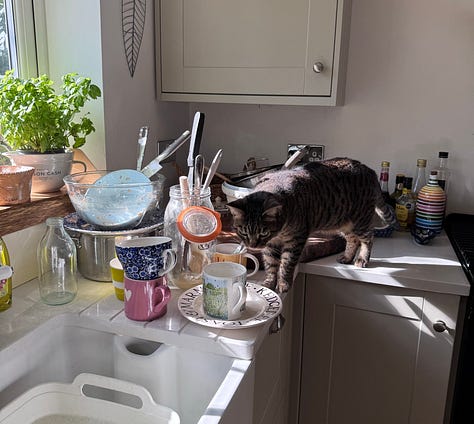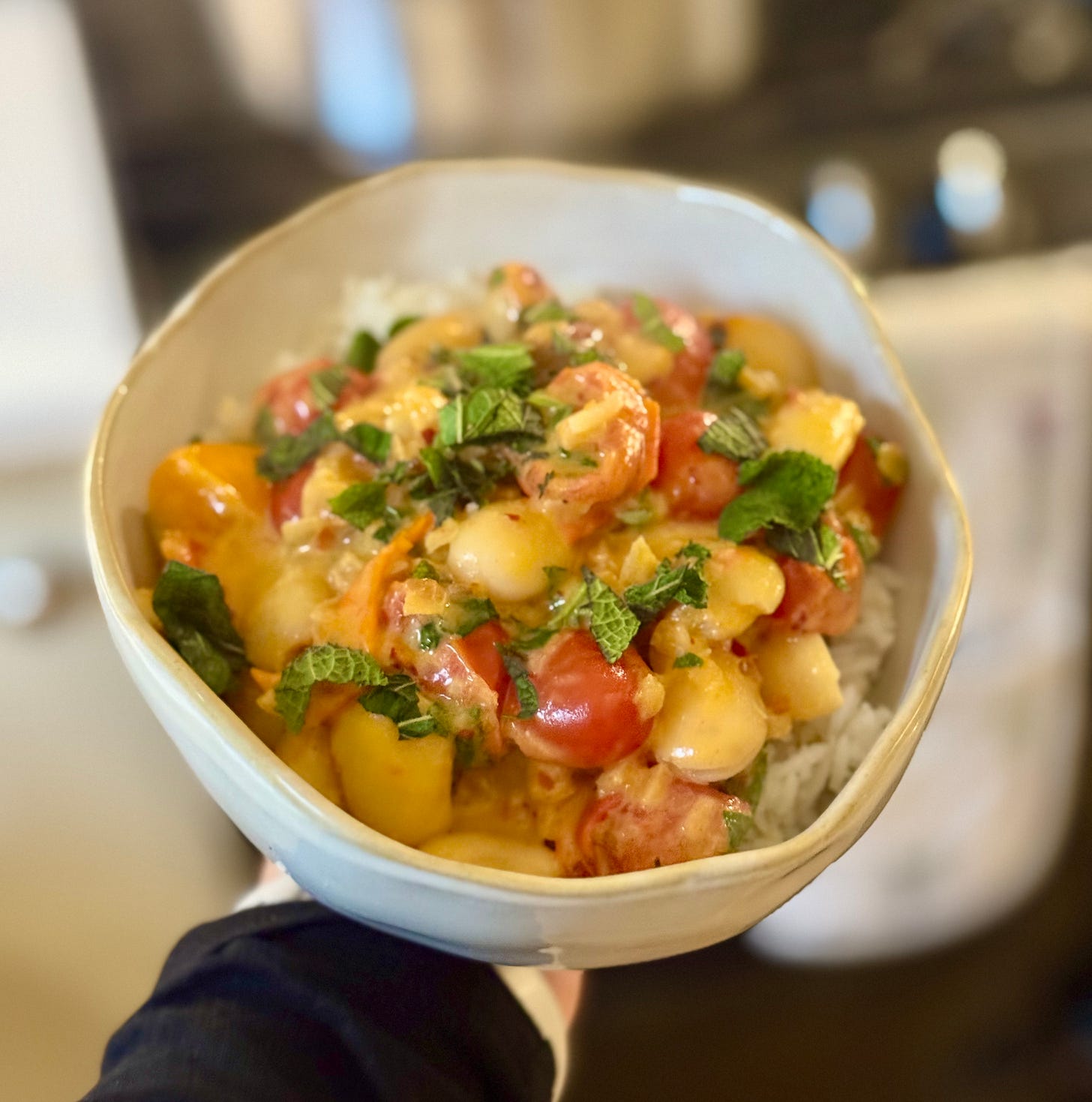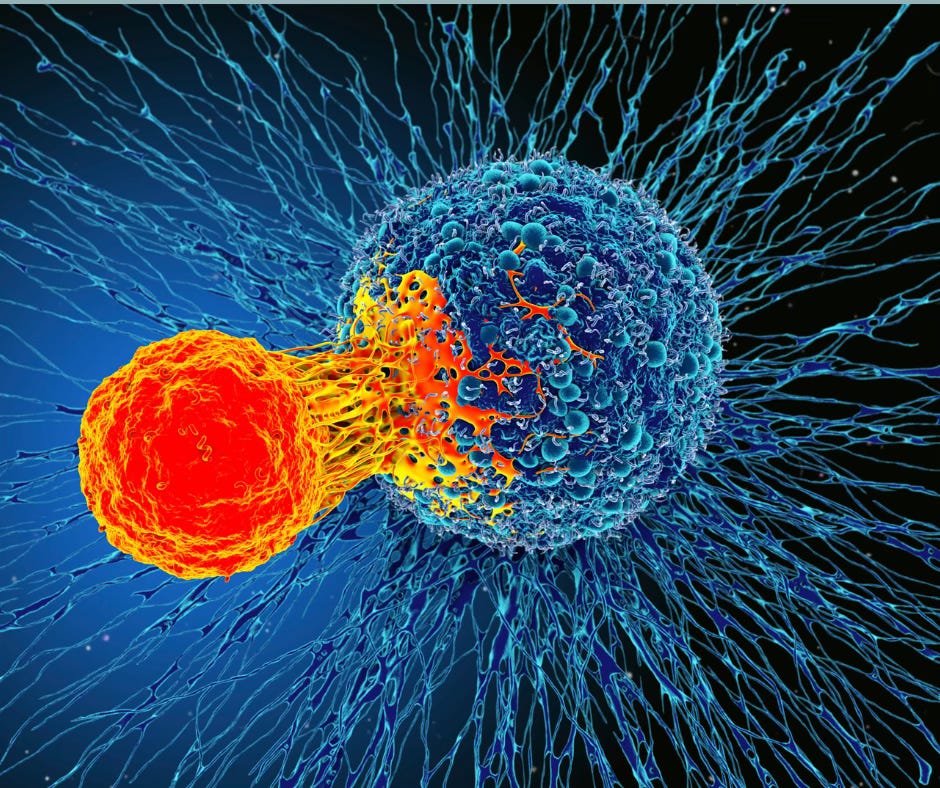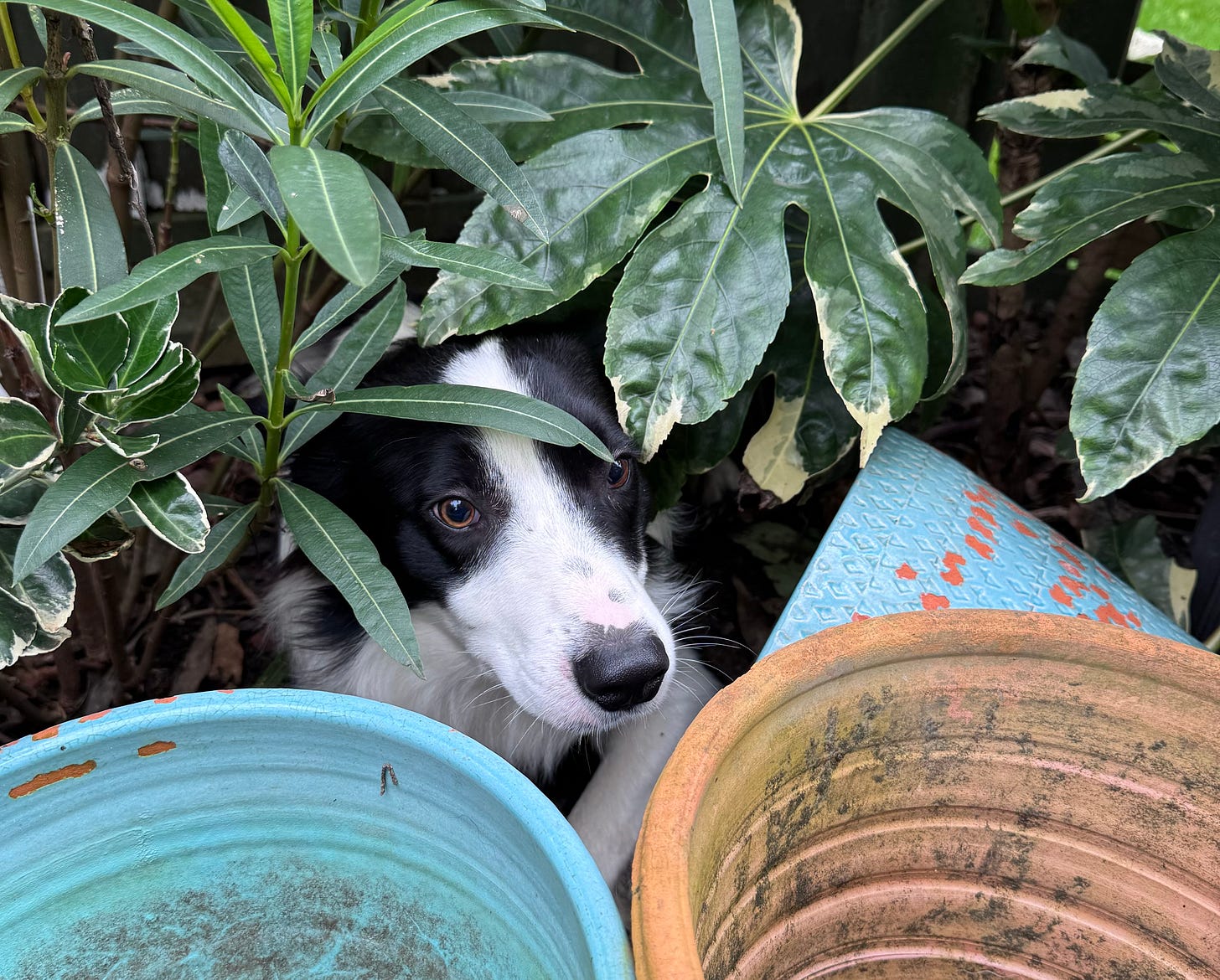From forest to fork
Does anyone need a protein Mars Bar? Butter bean sensation. Living to 100 (hint, butter beans are involved). Autoimmunity and Long Covid. Nutrition and cancer. From the dog basket.
You might wonder why, since Nuush is about nutrition, the main images on these newsletters aren’t of delicious and trendy meals or ingredients but, instead, are mostly of outdoor scenes – though I’ve broken the mould this time with one of the office on an autumn evening. There are a couple of reasons; the main one is that a diet needs context, it’s only one (v important) part of a healthy life, and for Nuush, the context is living naturally: spending time outdoors, getting hungry for dinner after a walk in the forest, eating seasonally and locally whenever possible, and embracing fresh air and green space. Not to mention caring for the environment by avoiding over-consumption. These are all traditional Mediterranean diet features too, which is Nuush’s blueprint. Another reason is that nature just makes beautiful photos, instantly, whereas photographing food is loads more time consuming and tricky, and I usually just want to eat it. So it’s a bit of me being impatient, lazy, and hungry!
That doesn’t stop me being attracted to other Substacks with their delicious header images of stuff like spicy chickpeas on a bed of Greek yoghurt with chilli oil and herbs. I love them, but I probably love nature shots just a little bit more.
I had lots of topics lined up for this edition but I’ve had to defer some as it all started to get a bit long. Next time though…
Protein
There is a ridiculous amount of unnecessary anxiety and hype around dietary protein. A cursory search on Ocado brought up 736 overt ‘protein’ products, often prefixed with the words ‘High protein’ – most are ultra-processed, like bars, shakes, rice cakes, yoghurt, wraps, bagels, ready meals and other liquid or solid gloop, including Protein Mars Bars, I ask you.
The fact is, it’s rare as hen’s teeth to be protein deficient in the UK, America or other relatively affluent countries. Most of us are eating a lot more than the recommended daily amount of protein, partly because we just eat SO MUCH food but also because all food contains protein, even your humble cauliflower.
An no, vegetarians and vegans aren’t protein deficient either; they get plenty of it – vegetarians eat eggs and dairy foods as well as the beans, pulses, nuts, seeds, grains, fruit and veg that vegans eat – all of which provide protein.
Of course if you eat a big steak you’ll get a load of complete protein in one hit but you’ll also get a brilliant amount throughout the day when you eat a healthy varied diet of real food, as we all should.
Let’s look at a vegetarian day: Start the day with beans on toast, have an egg salad for lunch, with a handful of nuts and a piece of cheese, drink some kefir and fruit in the afternoon and finish the day’s eating with tofu and edamame stir fry and wholegrain rice.
That gives you 81g of protein and that’s without what you get from the veg. General guidelines say about 0.8g of protein per kg body weight. So let’s say you are 11st (about 70kg), that would mean a target of 56g of protein each day, so the day’s diet above would see you well in-range. And most people eat more food than that in 24hrs.
Some people do need a bit more than the 0.8g per kg – it depends on age, state of health and a couple of other parameters, and most of them are getting it.
This Zoe pod with Dr Federica Amati explains it all really well. Some of its simple messages are:
In developed, high income countries healthy people are eating more than enough protein.
All foods contain protein and that includes vegetables.
There are 20 amino acids (the building blocks of protein). Of those, 9 are ‘essential’, meaning we need to get them from the diet.
When it comes to exercise, only elite athletes training for several hours each day need more, not people who go to the gym or train recreationally.
There isn’t a magical time window in which you have to eat protein after exercise.
We have evolved to absorb protein really well.
Children, pregnant women and older people need more but can get it from real food, as can all of us.
Protein bars and shakes have all sorts of undesirable additives. Get your protein from real food.
Lions’ Mane, Pumpkin seed extract, Reishi mushrooms, creatine.
Coming in the next edition because I’m seeing them all being hyped-up at the mo!
This has been a big hit lately
Jarred pulses are a game changer, compared to the bullet-like ones that come in tins, and this recipe really puts them in the spotlight. I used to hate butter beans as a child, but back in the day they weren’t jazzed-up with stuff like harissa and mascarpone. This has been on the plans a few times since I invented it about six weeks ago and always gets rave reviews. Even better, it’s really quick to knock up. Serve it with wild rice, which is a whole grain and, I think, much nicer than normal brown rice.
Creamy butter beans with cherry tomatoes and harissa
The brilliance of a Mediterranean diet
The Mediterranean diet is one of the most well-researched dietary patterns, with VAST amounts of solid, top-tier evidence showing that it improves health, helps to prevent chronic diseases and promotes (healthy) longevity.
It would be easy to think it consists of the foods we have on holiday in the Med – big plates of pasta, meat dishes, pizza, a basket of bread and a side of chips. But, not so fast, the science is rooted in the traditional diet of people in the Mediterranean Basin several decades ago. A diet that came out of poverty and necessity. It’s a simple diet of whole foods, focusing on plant foods, where meat was only eaten at times of celebration. All of its vegetables, whole grains, olive oil, nuts, seeds, pulses and fermented dairy (like yoghurt), impart wonderful health benefits. It does include fish, meat and poultry too, but in far less quantity than the standard western diet that is making so many people really sick.
You’ve probably heard of the Blue Zones, or seen Dan Buettner’s brilliant Netflix series about them. They’re places in the world where more people live to 100+ than anywhere else, and they ‘share a diet’, the Med diet. Research suggests that the Mediterranean diet promotes this longevity and the general healthiness and sprightliness of populations in places like Ikaria, Sardinia, Okinawa, Loma Linda (bit of an outlier, but there are ‘reasons’) and the Nicoia Peninsula. Its anti-inflammatory and antioxidant-rich foods, with healthy fats and fibre, protect against chronic diseases and support gut health, making people feel great, and last longer. It sits within a lifestyle of connection – shared meals, shared worship and community spirit, as well as functional exercise (that means being active through daily tasks rather than going to the gym). This makes the Mediterranean diet and lifestyle one of the most effective and well-supported patterns of living for long-term health.
And that’s why Nuush’s ethos is rooted firmly in it!
There is no time like now to join Nuush!
Autoimmunity and long covid
COVID-19 may trigger autoimmune diseases through several mechanisms, and this is the subject of much scientific research, post-pandemic. One mechanism is molecular mimicry, where the immune system, while attacking the virus, mistakenly targets similar-looking proteins in the body, causing damage to tissue and organs.
Another mechanism is bystander activation, where the body’s massive immune response can wake up dormant immune cells, leading to inflammation and tissue damage. Additionally, viral persistence may keep the immune system activated long after the infection, increasing the risk of autoimmunity. Severe cases of COVID-19 can also lead to a cytokine storm, an extreme inflammatory response that disrupts normal immune regulation, contributing to autoimmune conditions like lupus or rheumatoid arthritis. Finally, epitope spreading occurs when the immune system's response to the virus expands to mistakenly attack the body’s own tissues, widening the autoimmune reaction. Some autoimmune diseases have been found to be triggered more than others, post Covid infection, including, Lupus, rheumatoid arthritis and Guillain-Barré Syndrome.
There might be precursors that make some people more susceptible to Covid-triggered autoimmunity, these include genetic predisposition, pre-existing autoimmune or inflammatory conditions, severe Covid infection, persistently raised inflammatory markers (can be the result of chronic stress or poor diet), higher viral load or viral persistence, age and sex (with women and older individuals being more susceptible), use of immunosuppressive treatments or medications, and pre-existing or reactivated viral infections like Epstein-Barr virus (the *thing* behind Glandular Fever).
Why am I even telling you all this?
Because autoimmunity, and long Covid, symptoms, can be hugely quietened by eating a healthy diet and making some positive lifestyle changes. I can say that with conviction as I had an active autoimmune disease for eight years and after eight years of medications for it I finally kicked it into remission through a simple change in diet. I’m not saying it’s that straightforward for everyone but what we eat and how we live can be so influential.
Food and lifestyle behaviours can really help to reduce inflammation, support the immune system, and improve overall well-being. Eating an anti-inflammatory diet, with foods rich in antioxidants and omega-3 fatty acids, such as fruits, vegetables, nuts, seeds, and oily fish can make a profound difference. The Mediterranean diet, with its whole foods, healthy fats (especially olive oil), and plant-based focus, has been shown to reduce inflammation and improve symptoms in conditions like rheumatoid arthritis. For some people there are trigger foods, these can vary greatly between individuals but there are some more common inflammation-triggering foods and drinks such sugar and alcohol, as well as food additives. But it could be any food, and it is important to identify which foods may be triggering symptoms. When it comes to nutritional supplements (you know I prefer a food-first approach though), omega-3 and vitamin D can be key players. Other nutrients include turmeric, zinc, magnesium, selenium, quercitin but it’s always best to consult a qualified nutrition professional before taking a cocktail of supplements, and many of those nutrients are found abundantly in certain foods.
Take the guesswork out join Nuush
In terms of lifestyle interventions, stress management is crucial, as chronic stress can worsen autoimmune symptoms by increasing inflammation. Practices like mindfulness, yoga, and meditation can help alleviate stress. Regular, moderate exercise such as walking or swimming reduces inflammation and supports overall health. Adequate sleep is another key factor, as poor sleep can exacerbate autoimmune flare-ups. Establishing a consistent sleep routine and practicing relaxation techniques can improve sleep quality. Mind-body practices such as yoga, tai chi, and acupuncture offer additional benefits by promoting relaxation and improving mobility. Finally, stopping smoking is essential for reducing disease severity, as smoking is a known risk factor for many autoimmune conditions.
These diet and lifestyle changes can be tailored to individual needs, complementing medical treatments to help manage autoimmune diseases more effectively.
If you have an autoimmune disease or Long Covid and need help with managing symptoms, put your name on the waiting list for Nuush Nutritional Therapy, being introduced in January. Just email sally@nuush.co.uk to express your interest.
Nutrition and cancer
I don’t think anyone reading this will have gone through their life without knowing someone with, or losing someone through, cancer. According to Cancer Research UK, 1 in 2 of us will be diagnosed with cancer at some point in our lifetime.
A really common question that people ask, or think, when they receive a diagnosis is “What should I eat?”, sadly they are often given very vague and blanket advice. Yet diet is one thing people feel they can still have some agency over, and nutrition plays a crucial role in the overall care and recovery of people with cancer. While it can’t cure cancer, a well-balanced diet can significantly improve the quality of life, and support treatment and recovery.
Here are some of the ways good nutrition, and qualified nutrition support, can benefit people with cancer:
It can address loss of appetite, fatigue, nausea and changes in taste, helping maintain a healthy weight and prevent unintentional weight loss. Providing the body with the necessary calories and nutrients to support strength and vitality.
It can support healing and recovery. Cancer treatment can leave the body depleted and under-par. Nutrition can help it to restore itself, making the person feel so much better.
Eating well can improve mental and emotional health, which can be laid low after diagnosis and through treatment.
It’s helpful to work closely with healthcare professionals to develop a nutrition plan that suits individual needs and treatment goals. In January, when we introduce Nutritional Therapy, this is an area we will be developing; I will be undergoing further training in nutrition for people with cancer, in order to support people alongside their medical treatment.
Loneliness and health
Coming in the next issue.
Why it can be dangerous to blindly supplement iron
It’s really easy to pick up a pot of iron supplements while doing the weekly supermarket shop, and they’re one of the more commonly-taken supplements (luckily, in this case, most people buy supplements and hardly ever take them).
But blindly supplementing iron, that means without a deficiency diagnosis, can be dangerous because of the risk of iron overload, which happens when the body absorbs more iron than it needs. Excess iron can stack up in the body, leading to serious conditions like liver cirrhosis, heart disease and diabetes. Not only that, too much iron can act as a pro-oxidant, that’s the opposite of anti-oxidant and means that something that creates harmful free radicals that can do damage by attacking cells and proteins and causing inflammation, scar tissue and disfunction.
Unnecessary or excessive iron supplementation can also hide underlying health conditions, like gastrointestinal bleeding or malabsorption disorders, by temporarily increasing iron levels without addressing the root cause. Also, too much iron can cause digestive issues, including nausea, constipation and abdominal pain, while interfering with the absorption of other important nutrients like zinc and copper.
Supplementing iron should only be done after a confirmed diagnosis of iron deficiency, typically through blood tests measuring ferritin, haemoglobin and serum iron levels. Doing this through your doctor or other qualified healthcare provider is crucial before starting iron supplementation.
Iron-rich foods: Nuts, seeds, pulses, tofu and tempeh, green leafy veg, whole grains dried fruit. fortified foods, fish, shellfish, poultry and meat. Even cooking in a cast iron pan helps!
Similar story with calcium supplements, another commonly-bought one, but I’ll talk about that next time.
From the dog basket
Next week, on October 23rd, would have been Scout’s 13th birthday, I always thought he’d make it to 15 as he was such a strong and fit boy, but he’s been gone for nine months now. Stupid cancer. I still accidentally call Moss ‘Scout’, and he doesn’t seem to mind. When we go and visit him up in the woods each day, I tell him that we miss him, and ask him if he can come for a walk and come home with us, in the hope that his spirit will find a way, which I’m completely sure it does. We’ll have a little birthday party up there next week, and take some cake for the birds, they can eat it on his behalf, which he will be a bit cross about.
Mean time, Moss has rolled in quite a few things since we last spoke. Only yesterday he completely caked himself in cow pat, and looked most delighted by it. He has several irrational fears, as do most Border Collies; only this morning he ran into hiding when Evie appeared out of the back door with one of his most frightening dog toys – a great big fluffy stuffed pheasant that she was in the middle of ‘killing’. You’d have thought his life was in grave danger…
Lottie has developed a bit of arthritis in her back legs so she’s having some special things in her food, like cod liver oil, and is getting loads of kisses and cuddles.
As for Evie, she continues to dominate the household like the pint-pot that she is. Demanding to sleep on all the dog beds all at once, and have a taste of literally everyone’s and everything’s dinner, whether invited or not. She smells like a polecat, despite regular showers, mostly because she loves to join Moss in a badger-‘spraint’ spa on a daily basis.
The cats are just ‘catting about’ on all the radiator covers and duvets, coating everything in fur and leaving me a few piles of sick and dead pigeons in secret places. Who’d have ‘em?
As for the chickens, they’ve stopped sleeping outdoors now, and take themselves into their house at about 4:30pm – you can track the seasons by their behaviour. They still refuse to eat actual chicken food, so I have to buy them premium bird seed mix and make them porridge and berries, or yoghurt and flaxseed, otherwise they just stand around sulking.
Love and health, ‘til next time, and always,
Sally, Iain, Thomas and the furry gang xx
P.S. Going to do a bit about Iain and Thomas in the next issue…. Thomas has a new kitchen!



















So interesting about the auto-immune and that you have had such success with it. X
Great read, thank you so much for taking the time to write Sally! So my (vegan) friend who is a seriously good cook swears by her instant pot for preparing beans. She said no soaking time and they just come out really tasty with minimal effort, she said you can freeze any leftovers for next time. I’m seriously tempted to get one!